Scratch 1.6X Praetor Upscale Original Design / Scratch Built
Scratch - 1.6X Praetor Upscale {Scratch}
Contributed by John McClure
| Manufacturer: | Scratch |
| Style: | Futuristic/Exotic, Upscale |
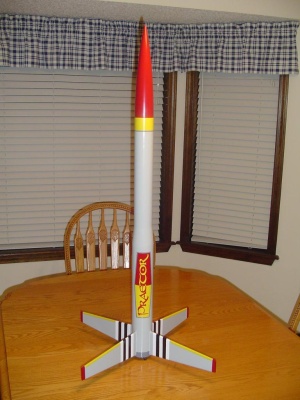
Brief:
Single stage, parachute recovery, 29mm MMT 1.6X Upscale of the FlisKits
Praetor.
Construction:
The lower main body tube is a BT-80H tube ("H" for heavy wall). The
upper body tube is a standard wall thickness BT-70 tube. The original Praetor
model rocket design breaks at the transition, but on my mid power version, the
nose cone separates for deployment. The BT-70 tube extends down into the lower
BT-80 tube and butts against the top MMT centering ring. This makes a
"double wall" tube for extra strength. The transition piece is made
from two wraps of Bristol Board soaked in CA glue. Once assembled, the entire
body tube was sanded then wrapped in 1.4oz fiberglass cloth using ACP's
EZLam-60 resin.
The four fins are constructed of 3/16" thick Nomex® honeycomb/Carbon Fiber composite material from AeroSpace Composite Products. The fins were edged in 3/16" square basswood then covered with 1.4oz fiberglass cloth. They are thru-the-wall construction with 6oz fiberglass gloss providing extra strength on the internal fillets. Due to the high-aspect ratio of the Praetor's fins I was hoping to get a lightweight, yet stiff fin can. I believe I succeeded.
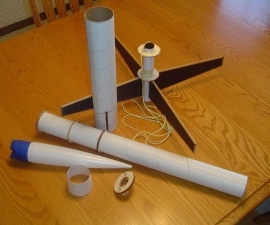
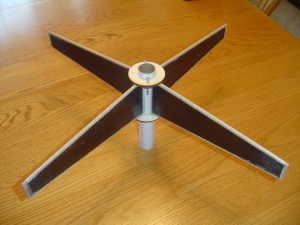
The motor mount tube is a BT-52H, heavy wall 29mm tube. There are three 3/16" thick custom laser cut centering by BMS on the MMT. The recovery system consists of a 1/4" tubular Kevlar® shock cord epoxied to the MMT. The tubular Kevlar® is attached to a length of 5mm climber's accessory cord. For the nose cone, I used an Apogee P/N 19470 BT-70 plastic nose cone. The nose cone is not true to the upscale, but is sure looks cool and was a lot easier to source than a custom cone.
This is the first time I've used composite honeycomb materials. Other than the fins, construction is fairly standard mid-power. Cutting the Nomex®/CF material is a breeze as long as you use the special saw blade from ACP. I tried making the first cut using an X-Acto knife with #11 blade. Although I did cut it eventually, I would not recommend it. The composite blade fits on a coping saw and makes the job much easier.
Finishing:
The fiberglass on the body tube made finishing much nicer. There were no
spirals to fill! Jim Flis was kind enough to share the "official"
Praetor lettering font with me so I could make my own version of a Praetor
logo. The graphics were traced onto self-adhesive vinyl sheets and cut out with
an X-Acto knife so they could used as masking stencils. The painting took a
while with all of the masking and spraying, but it turned out pretty good.
There wasn't anything exotic with the paint, just good old Krylon rattle cans.
A final coat of Future Acrylic polish gives it some gloss.
Flight:
The first two flights were with AeroTech G38-7FJ Single Use motors. I got
lucky. These motors/delays are a perfect match for this rocket. The third
flight was on a G33-7J load in my AT RMS 29/40-120 case. The G33 is also a good
motor for this bird, but the 7 second delay was a bit long.
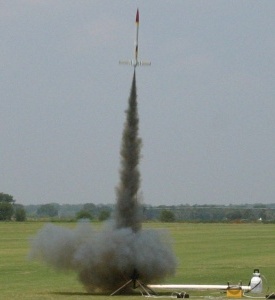
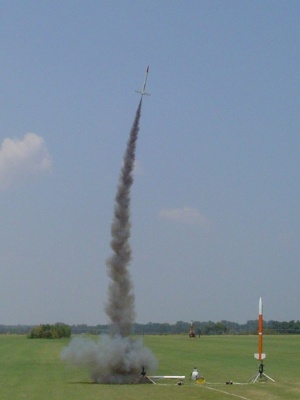
Flight prep is standard fare. Kaplow clips for motor retention. I use a bit of dog barf wadding even though there is a Kevlar® chute protector attached. The dog barf is mostly out of habit, but it does protect the chute protector.
Flights are a larger version of the mod-roc Praetor. Slow lift off and straight as an arrow. One neat side effect of the long fins is the aerodynamic whistle that can be heard once the motor burns out and the rocket coasts to apogee.
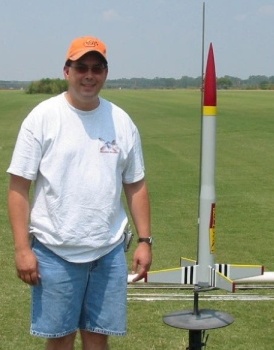
Summary:
I absolutely love this rocket. With it's long fins, it always gets looks at the
flight line. The mod-roc Praetor is one of my all-time favorites. This mid
power version is more of the same. I was initially worried about the fins
holding up to landing stresses, but after three perfect flights, my worries are
gone. This is a rocket I hope to keep around for a long time.
Sponsored Ads
 |
 |











